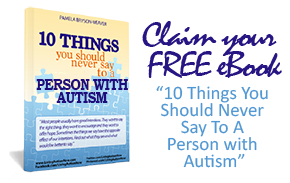
To many people, winter is making Christmas wish list, of Santa Claus and his reindeers, of frolicking in the snow with friends and family or of drinking a mug of sensational chocolate. To some autism parents and children, however, this is a dreadful time of the year when the days are growing shorter and the night colder and darker. Some call it the “winter blues.” I call it “meltdown magnet.”
Yes, as many people await the celebration of Christmas and New Year, many autism families are also getting ready for the long haul ahead. Cloudy and cold days can easily run kids with autism’s emotional and psychological battery. Depression and anxiety easily gets into them as the cold swirls around Canada and neighboring states.
One of the scientific reasons behind this contention is that during winter, a child’s (whether autistic or not) melatonin and serotonin level can be disrupted. Lack of daylight put photoreceptors which stimulate the production of serotonin as well as cortisol at a standstill. It also affects the pineal gland’s overproduction of the sleep hormone, melatonin. These two conditions often result in lack of energy, mood swings, poor or erratic impulse control, depression, anxiety, and sleep problems. To kids with autism, this could mean meltdowns in epic proportions.
What to Do?
Preparation is always the key to autism families. Every change of season, kids with autism are virtually prepped on what to expect for the dreary days ahead as well as in understanding the concept of Christmas and gift-giving, and why we celebrate the New Year, Thanksgiving as well as Halloween. Holidays can be such a struggle to these kids as their senses can go on haywire with all the festivities that these occasions bring. Keeping them informed with visuals especially videos will be useful but still, it is important to be always on guard especially when out and about.
This is also a time to engage in physical exercise to some. Not only will exercise keep the mood light, it helps relieve stress and anxiety, two of the most common meltdown triggers. Kids with autism love to wander and discover things that interest them. A morning walk around the block or in the part—with you (you may even bring his or her service dog, if you have one) can be of great help. To some, phototherapy and mind-body therapies like yoga, body massage, and guided imagery can also help keep the blues away. Some also resort to prescription anti-depressants. But before you engage on this, make sure to consult with your doctor beforehand.
Somewhere Sunny
In our case, we often bring John to somewhere sunny during this time of the year. Last time, we opted to do some cruising on board the Independence of the Seas. John loves to cruise. The sun, ship activities and water adventures made him less agitated. I also see to it that his room gets as much light as possible. Drapes and curtains are replaced with a much lighter shade. Luckily, he also loved the smell of chamomile or lavender which is very relaxing. The chamomile tea for John, however, is not that successful.
Indeed, in all these it is important to always plan ahead. Autism leans on repetitions and familiarity. Taking steps the earliest time possible will help keep the triggers at bay. A quick check with your son’s or daughter’s holidays.

